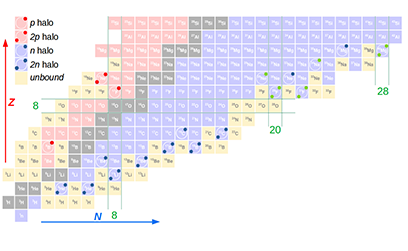
Joined the laboratory in 2023
- BS, Physics, University Paris-Sud XI, France 2013
- MS, Physics, University Paris-Sud XI, France 2015
- PhD, Nuclear Physics, University of Caen Normandy, France 2018
- Experimental nuclear physics
Research
My research interests hinge around the study of nuclear forces at play in nuclei with large neutron-to-proton asymmetry. For a given number of protons, the more neutrons we add to a stable isotope, the more short-lived the nucleus becomes, until we reach the so-called neutron dripline. This marks the limit beyond which the ground state of the nucleus is no longer bound and instantly decays by emitting one or more neutrons. It is only recently that the study of nuclei located at and beyond the neutron dripline has become possible due to the significant developments in high-intensity beams and high-efficiency detection arrays. However, despite all those efforts, the location of the neutron dripline is only known up to neon (with proton number Z=10) experimentally. The study of nuclei in the vicinity of the neutron dripline provides unique opportunities to investigate the large variety of phenomena arising in this region, such as structure changes, deformation, clustering, and halo formation.
We take advantage of FRIB's unique capabilities and conduct experiments using a complex set of detectors required to detect neutrons, gamma-rays and charged particles in order to investigate new regions of the dripline. This work is performed within the MoNA collaboration and in collaboration with other research groups at and outside FRIB.

Biography
I was born and raised in the Cotentin peninsula of Normandy, in France. I got most of my college education in the University of Caen Normandy and in the University of Paris-Sud XI, just southwest of Paris. I also had the opportunity to spend the first year of my masters in Stockholm, Sweden, as part of the Erasmus exchange program, and followed lectures at both KTH Royal Institute of Technology and at Stockholm University. I obtained my PhD from the University of Caen, France, where I was interested in the study of nuclear forces at play in neutron-rich nuclei, and I was highly involved in experiments performed at the RIKEN facility in Japan. I then joined the National Superconducting Cyclotron Laboratory as a postdoc where I was interested in lifetime measurement experiments before obtaining a researcher position in France.
In 2023, I joined FRIB as an assistant professor where I am leading a research group focusing on the study of phenomena arising in light neutron-rich nuclei located at and beyond the limit of existence of nuclei. I am particularly interested in the study of shell evolution, deformation, and halo formation.
How students can contribute as part of my research team
Students are at the core of my research group. They take part in all aspects of modern experimental nuclear physics research such as preparing and running experiments, analyzing data, running simulations, developing detectors, writing experiment proposals and scientific papers, and presenting their results in domestic and international conferences. This research work is conducted in collaboration between all the group members, as well as other groups in FRIB and other institutions worldwide. This diversity of activities allows students to develop a large palette of skills that are useful for any career that they may pursue, and my main motivation is to put group members in the best position to achieve their career goals. Please feel free to contact me if you are interested in joining us.
Scientific publications
- Strong neutron pairing in core+4n nuclei, Revel et al., Phys. Rev. Lett. 120, 152504 (2018)
- Extending the Southern Shore of the Island of Inversion to 28F, Revel et al., Phys. Rev. Lett. 124, 152502 (2020)
- First observation of 28O, Kondo et al., Nature 620, 965 (2023)

